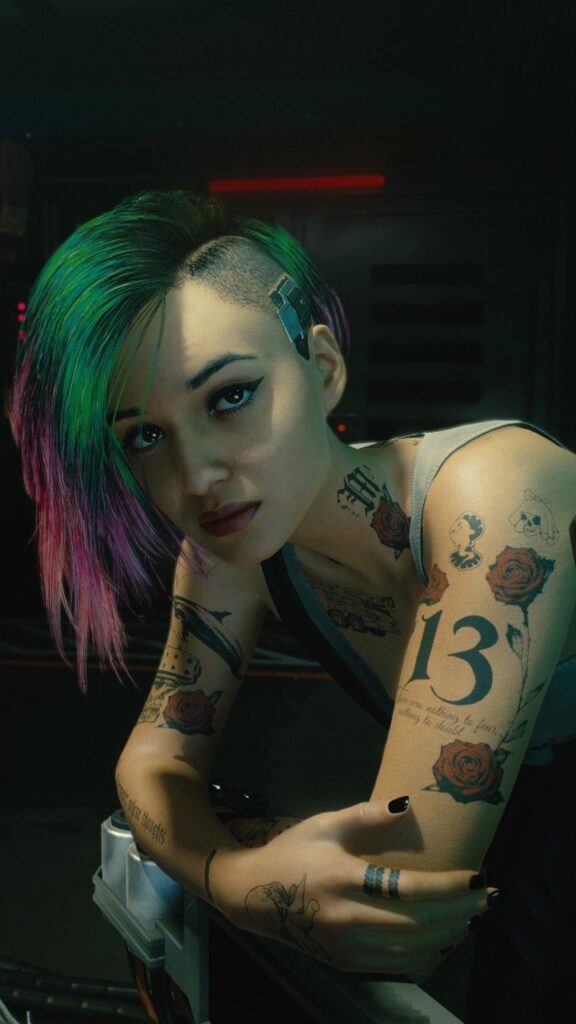Cyberpunk 2077 came out recently and, given that a bunch of outlets are going to review it because it will be culturally significant, I figured we should do the same. I’m not going to bother talking about the many glitches because others already fixated on that. Besides, popularity and significance of games are not necessarily harmed, and are sometimes even helped, by glitches (see Skyrim).
There are a few ways I thought of doing this article. One was to just draw parallels to Fight Club, of which there are many (protagonist doesn’t use a real name, a charismatic terrorist lives in the protagonist’s head and can take over his body, strong anti-corporate sentiment, etc) and say that this game is to Millennials as Fight Club is to Gen-X. However, these comparisons are so “on the nose” there doesn’t seem to be much value in it. Instead, I realized that Fight Club works more as a social commentary of the contemporary world, almost like the Ghost of Christmas Present. Cyberpunk 2077, and the tabletop it’s based on, is more the Ghost of Christmas Yet to Come and just like old Scrooge, I’m praying that future doesn’t come.
Cyberpunk 2077 is based on a tabletop role-playing game (think Dungeons and Dragons) designed in 1998 by Mike Pondsmith, about a future dystopian world. The fictional history in Cyberpunk breaks away from real history in 1990 and each new edition of the tabletop extended the timeline further to the future (starting first in 2013).
There are a lot of interesting philosophy and science fiction ideas in the tabletop and videogame, such as transhumanism, artificial intelligence, and what it means to be human, but even more interesting is the commentary on wars, corporations, and society.
Before the video game came out, images from the tabletop’s supplemental rule book spread online and people noted it was “almost borderline prophetic.” Namely, the line “Diversity led inexorably to anarchy” seems a fitting counterpoint to “diversity is our strength.” The inference could also be made that corporations pushed diversity in the world of Cyberpunk, just as our corporations do largely for personal gain. It’s also interesting that this line came from a black fellow who seemingly recognized that too much diversity is bad for everyone.
Mike Pondsmith said “Cyberpunk is a warning not an aspiration,” and it’s hard not to be reminded of that meme about 1984 not being an instruction manual. The way our timeline is progressing, it seems Cyberpunk really is prophetic, even if the timeline is a bit off and the corporation names are different.
One of the best lines from the videogame was “I realized that no matter the conflict, corps always win, ordinary people always lose.” It’s an apt line when looking both at the alternate history in Cyberpunk, including the four “Corporate Wars,” but also the history of conflicts the United States has engaged in for both its recent and not so recent history.

For people who think it’s insane for corporations to directly go to war with one another, it’s important to remember that Pepsi was once paid by the USSR with warships. Additionally, the United Fruit Corporation was able to pressure the U.S. government to “intervene” in Guatemala with Operation PBSuccess in 1954. When we live in a timeline where nations are overthrown because corporations own politicians, is it really out of the realm of possibility for Facebook or Google to get armies of their own? As we’ve pointed out before, corporations already own towns, so why not armies?
The scary thing about Cyberpunk 2077, that isn’t the case with Fight Club, is that it’s not just that corporations are evil or keep people in poverty. That’s certainly true, but in Cyberpunk the wealth divide is even greater, the masses live in squalor, and most people are not even able to eat real meat. The scary part is that as bad as things have been, it’s just that things will get worse. Diversity will further destroy towns, cities will begin to look all alike, and people will embrace destructive and dehumanizing technology (you can actually “hack” people to commit suicide in the game). As the pandemic forces people to stay indoors and stop socializing, we’ll see these economic ramifications, as well as, the greater acceptance of technology as a form of escapism. Likewise, with the dating scene devastated by Covid, there’s going to be an uptick in people buying sex dolls. The size and scope of companies like Facebook, Amazon, and Google will grow as small businesses collapse due to ever-extending lockdowns. With all this happening, Cyberpunk seems all the more prophetic. Stay tuned for when we have the first corporate war between Walmart and Amazon sometime in the next decade.
As it’s Christmas time, it’d be a shame to end with a downer and instead I want to bring back A Christmas Carol once more. We can ask the same question old Scrooge did: “Are these the shadows of the things that will be, or are they shadows of things that may be, only?” This future has yet to come and still can be averted. We know the various plots being cooked up against us. We know the trajectory this country is currently on is the same as that of the world of Cyberpunk, with enforced diversity, mass poverty, and no true sense of identity.
It’s up to us to change it.
A Southern man trying to make a good Southern plan.
Deo vindice!





It seems that corporations will continue to enjoy using national armed forces for their own ends. Taxpayers bankroll the operations, soldiers are equipped with overpriced gear and hardware, any blowbacks and scandals harm the country and citizens (PMCs can always rebrand), while oligarchs count their profits. What’s not to like in this arrangement?